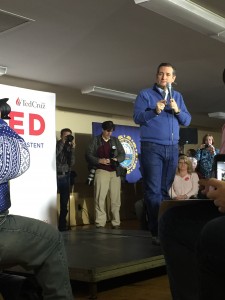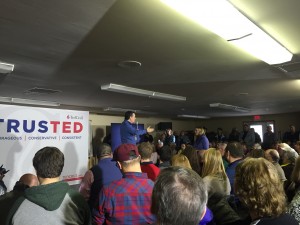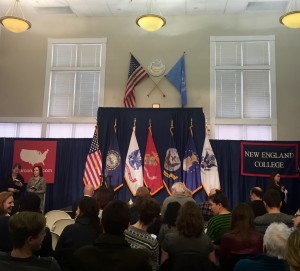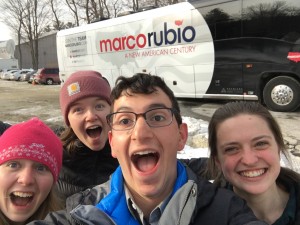Thus far, we have attended three John Kasich town halls. While the setting and tone of each was different, I consistently walked away with the same impression of the candidate. He is a moderate Republican with a substantial record as both a governor and a congressman. In his stump, Kasich emphasizes the importance of pragmatism and bipartisanship. He is more policy-oriented than some of his opponents, particularly Cruz and Trump. However, he seems slightly less wonky when compared to Jeb Bush. His sense of humor is awkward and his interactions with his audience are surprisingly confrontational. On paper, Kasich seems like a well-prepared candidate. However, in person, he is sarcastic, impatient, and bad-tempered.
On Monday, January 18th, after leaving Ted Cruz’s town hall in Washington, NH, we drove to Hanover for Kasich’s economic town hall at Dartmouth’s Tuck Business School. During the hour-long wait for the candidate to arrive, the lecture hall filled up with students, professors, administrators, and other community members. There were multiple overflow rooms prepared for the event. They were unnecessary.
Finally, the candidate arrived with his wife and twin daughters. He was introduced by former Governor John Lynch of New Hampshire, the business school’s president, and a second-year student. Kasich took the microphone and gave a brief stump speech. He seemed tired and ready to finish his day of campaigning. He apologized for being late, but blamed it on his staff and played it off with a Bill Clinton joke. Kasich explained that he was excited to take a moment on Martin Luther King, Jr. Day to reflect upon what has been done to make increase equality in this country and highlighted his record on criminal justice reform. Before taking questions, Kasich made an awkward reference to The Hobbit, but forgot the names of the main characters, so the whole thing quickly fell apart and he moved on to his concluding points.
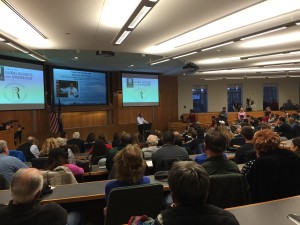
Kasich at the Tuck Business School
Kasich took over thirteen questions from the audience. The other candidates we have seen often take no more than five or seven. Here are a couple standout moments from the Q&A portion:
- One man in the audience, who had clearly attended other Kasich events, asked the candidate, if he will enact policies that are based in empirical fact as opposed to political expediency? The questioner cited a panel of climate scientists and when Kasich challenged him, he said “that’s what science says.” Kasich responded, “that’s what a panel says.”
- In response to another question about how he will help the youth of America, he explained that he is running a positive campaign. He explained that he “is not a prince of darkness.” John Kasich is “a prince of light”
- The second-to-last question was on campaign finance reform. Kasich gave a rambling, awkward answer that included statements like “give me money, whatever” and “I’m just a slob trying to make it through.” He did admit that he does think reforms need to be made to limit gerrymandering and the control of billionaires over elections.
The following Tuesday, January 26th, we attended two more Kasich town halls. The first was at Molly’s Tavern in New Boston, a small town outside Manchester. The space was small and no more than 40 people were in attendance. While waiting for the candidate to arrive I chatted with an older woman from the town. She told me that if Bloomberg enters the race as an independent and it’s between him, Trump, and Clinton, she would vote for Bloomberg. This could be the first election in her life in which she does not vote Republican. I asked her about her thoughts on other moderate Republicans. She explained that she likes Jeb Bush and thinks it is unfortunate how poorly he is doing. She attributes his low poll numbers to his lack of charisma, not his name. She thinks Marco Rubio is too young and is hesitant to elect another junior senator.
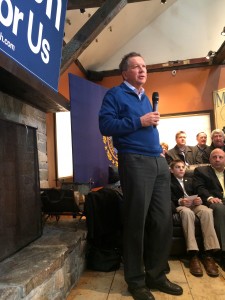
Kasich at Molly’s Tavern
The Ohio attorney general introduced the candidate, emphasizing their work on cleaning up the opioid crisis in Ohio. Kasich began his stump, which hit many of the same points as his Darmouth speech, but definitely emphasized his record on helping Ohioans with addiction. Here are of the interesting points from this town hall:
- At one point, he compared something to “hitting a home run… that’s like a two-point conversion.” The audience groaned and Kasich reminded them, “I don’t pander.”
- He turned to us and asked about our ages. He reminded us not to bully people, but then proceeded to judge one member of our team for being a Political Science major, asking, “what are you going to do with that?” (maybe become governor of Ohio… just a thought). He was relieved to learn Nora is also on the pre-med track.
- A high school senior asked Kasich how he would make college more affordable and if you would try to find ways to cap high interest rates on student loans. He struggled to give her a specific answer, suggesting that the young woman consider a couple years at community college. He turned to his staff and asked, “can somebody make a note on the interest rate issue?” He explained, “I don’t have an answer to every question.”
- One audience member asked why members of Congress who passed the Affordable Care Act are still allowed to hold office, since they approved legislation that the Supreme Court had previously deemed unconstitutional. A puzzled Kasich quickly responded, “I don’t think that happened.”
- In his concluding remarks he made one last plea for votes. He explained, “if I get snuffed out in New Hampshire, it’s ballgame over.” This moment of transparency and honesty certainly played well with the crowd.
We left Molly’s Tavern to get to Kasich’s next event at Franklin Pierce University in Rindge, NH. Even though we pulled out of the parking lot after the campaign bus, we waited for over half an hour before the event began. Finally, the president of the university and former Senator John Sununu introduced the candidate. “Seven Nation Army” came on over the loudspeakers and Kasich entered the room. Again, here are the highlights of this town hall:
- He opened his stump by telling the members of the audience that we are each “made to do something special.” While he has always framed himself as the “optimistic” candidate, this was an oddly kind note for the typically sarcastic Kasich to take.
- He also highlighted his pragmatic approach and tendency to work well with Democrats. According to Kasich, during his presidency, the Republicans will call the tune, but everyone will be included in the orchestra. He explained that he is not beholden to the Republican Party, because he “only takes orders from one person in the world, [his] wife.”
- When someone asked him about campaign finance reform, he seemed more genuinely prepared and interested, explaining that he thinks the issue is “really significant.”
On the whole, Kasich clearly has a lot of experience as both an executive and legislator. He knows his policy and avoids clichés. However, unlike some of his opponents, he rarely has big applause lines. He doesn’t preach like Cruz or pander like Rubio. He lacks the charisma and interpersonal skills that make candidates successful in these small settings. After having seen Kasich’s performance in these three town halls, the lackluster nature of today’s New York Times endorsement is apt.
Not sure if we will find ourselves at another Kasich event next week, but keep reading to find out!

